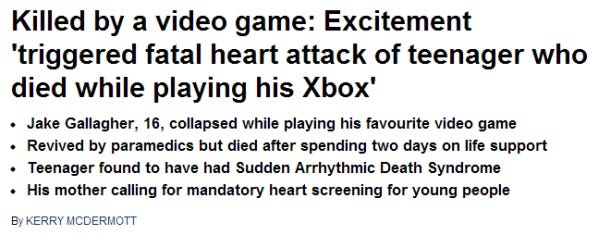Killed By A Heart Condition: Daily Mail Exploits Teen’s Death
Reacting every time the British Daily Mail posts one of its clickbaiting articles about videogames is a mistake. It brings the nasty, hypocritical rag the attention it so craves, letting it spread its hate further. But then there's a story like today's that is so revolting, so opportunistic, that a response is necessary. A place to point people toward if they've read it and are scared. Balance for the universe. Today the tragic death of teenager Jake Gallagher is being exploited by the newspaper to continue its campaign to create pointless fear in the minds of parents when it comes to videogames.
Jake Gallagher died of a heart condition called Sudden Arrhythmic Death Syndrome (SADS). The dramatically titled illness is precisely what it says - a sudden death caused by arrhythmia (abnormal electrical activity in the heart), where autopsy shows no identified heart disease. In the US alone it kills around 200,000 people a year. Undiagnosed in the teenager, it wasn't possible for his family to know that he was in any danger. So it is a horrific tragedy that Jake died from this condition, that could have been triggered by anything, at any time. The Daily Mail chose to headline the sad story of his death with,
"Killed by a video game"
Which is a lie. He was killed by a heart attack. The trigger for his heart attack, say his family, was when he became over-excited while playing Sonic The Hedgehog. Jake could equally have had his condition triggered by any number of other stimuli, and then we would likely have never heard of him, as his death wouldn't be useful for the paper to score some points.
Becoming over-excited by playing Sonic may sound peculiar in and of itself. But what's even further buried in the story, thrown away in a sentence about something else entirely, is that Jake had Asperger's Syndrome - a form of autism.
"Jake, who had Asperger's Syndrome, had not had heart screening, which has not been made compulsory by the government."
This is a common writing trick that's used by the Mail, where a fact needs to appear in a story for there to be even a fraction of honesty taking place, but is thrown in at the start of a sentence that ends on a completely different subject. This switch is designed to have you dismiss the first fact, and focus on the matter of screenings, which had been previously discussed by the article. Asperger's usually causes a person to find social interaction and non-verbal language very difficult, and more relevantly, to obsess on certain repetitive activities. It may be book reading, fact learning (seemingly inevitably about trains, in my experience), or of course video games. The repetitive nature of games is a perfect fit for someone with Asperger's, and it's no surprise whatsoever to learn that someone in Jake's situation may form a keen attachment to a game like Sonic.
The tragedy is that the SADS was undiagnosed in a teenager with Asperger's - someone who is by nature prone to emotional outbursts and over-excitement with particular stimuli.
The Gallagher family have called for routine heart screening of young people to identify such conditions early on. This may have made for a good headline for a story about their son's death - Family Campaigns For Heart Screenings After Death Of Their Son, for instance. Not, "Killed by a video game." But that doesn't fit the cruel agenda of spreading irrational fear that the paper identifies as one of its key selling points.
The paper's article concludes with three giant photographs. Two large shots of the grieving mother and family, sandwiching a photograph of an original Xbox, to ensure the message is as clear as possible: This object, in your home, is deadly, and could kill your children at any moment. It's a stupid, pointless lie, and one that entirely diverts attention away from the cause the family are trying to highlight: their desire that heart screening be routine.
For more information on SADS, the British Heart Foundation have a downloadable booklet. Giving them money is pretty helpful too.









